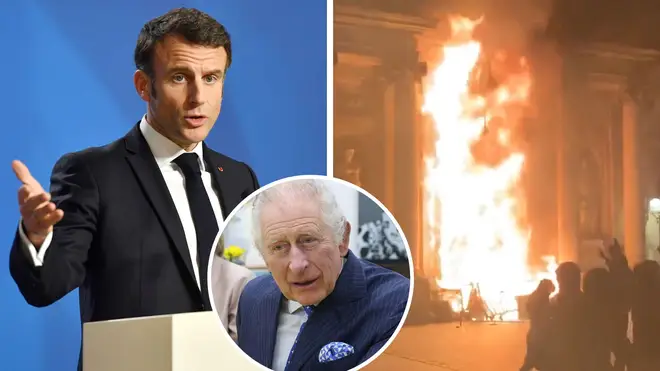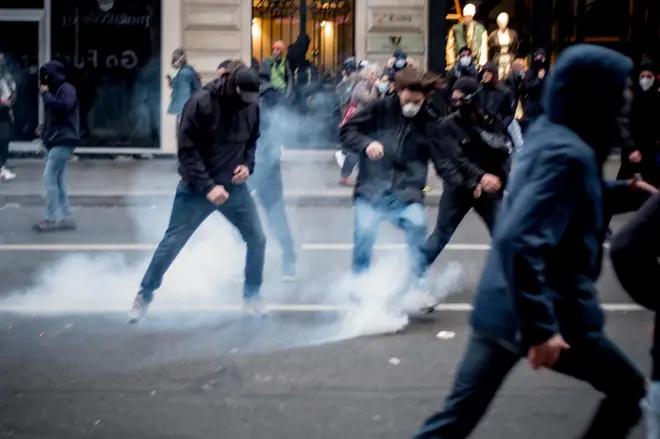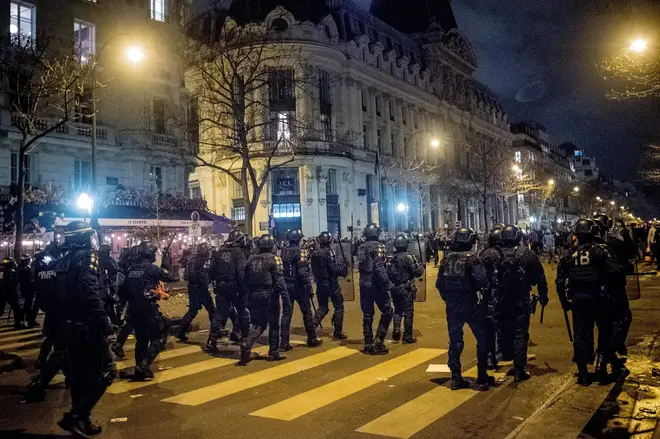
James O'Brien 10am - 1pm
24 March 2023, 10:43 | Updated: 24 March 2023, 15:58

France's embattled President Emmanuel Macron has said it was "common sense" to let King Charles visit amid destructive protests.
We said the monarch's visit, which had been due to begin on Sunday, "would have prompted incidents" which would have been "detestable".
"We would not be serious… to make a state visit in the middle of protests," Mr Macron said.
There have been security concerns after days of angry demonstrations about pension reforms, with French unions calling for even more protests to coincide with His Majesty's visit to Paris.
Buckingham Palace said in a statement: "The King and The Queen Consort's state visit to France has been postponed.
"Their Majesties greatly look forward to the opportunity to visit France as soon as dates can be found."
A Government spokesman said: “The King and Queen Consort’s State Visit to France has been postponed.
“This decision was taken with the consent of all parties, after the President of France asked the British Government to postpone the visit.”
An official for the Elysee Palace said: "In light of yesterday's announcement of a new national day of action against pension reforms on Tuesday, March 28, in France, the visit of King Charles III, originally scheduled for March 26 to 29 in our country, will be postponed.
"This decision was taken by the French and British governments after a telephone exchange between the President of the Republic and the King this morning, in order to be able to welcome His Majesty King Charles III in conditions that correspond to our friendly relationship.
"This state visit will be rescheduled as soon as possible."

Macron says ‘common sense’ meant delaying King Charles’s visit

More than 1 million people demonstrated across France on Thursday against unpopular pension reforms, with violent clashes breaking out in some places.
Unions had called for new nationwide strikes and protests next week, coinciding with King Charles' planned visit to France.
A march in Paris which was marred by violence drew 119,000 people to the French capital. There were further marches elsewhere in the country.

Polls say most French people oppose president Emmanuel Macron's Bill to increase the retirement age from 62 to 64, which he says is necessary to keep the system afloat.
Building on the strong turnout, unions swiftly called for new protests and strikes on Tuesday when Charles is scheduled to visit Bordeaux on the second day of his trip to France.
The heavy wooden door of the elegant Bordeaux City Hall was set on fire and quickly destroyed on Thursday evening by members of an unauthorised demonstration, the Sud Ouest newspaper said.

Nationwide, more than a million people joined protest marches held in cities and towns around the country on Thursday, the ministry said.
Interior minister Gerald Darmanin, visiting police headquarters on Thursday night as fires still burned in some Paris neighbourhoods, gave assurance that security "poses no problem" and the British monarch will be "welcomed and welcomed well".
He said there was "enormous degrading" of public buildings and commerce on Thursday, "far more important than in precedent demonstrations".
"There are troublemakers, often extreme left, who want to take down the state and kill police and ultimately take over the institutions," the minister said.
Today, @lewis_goodall reports back after witnessing protestors clash with police on the streets of Paris as the French demonstrate in enormous numbers over the state pension age being raised.
— The News Agents (@TheNewsAgents) March 24, 2023
Coming soon to @GlobalPlayer pic.twitter.com/NPQdFCGOYL
The demonstrations were held a day after Mr Macron further angered his critics by standing strong on the retirement Bill that his government forced through parliament without a vote.
"While the (president) tries to turn the page, this social and union movement... confirms the determination of the world of workers and youth to obtain the withdrawal of the reform," the eight unions organising protests said in a statement.
It called for localised action this weekend and new nationwide strikes and protests on Tuesday.
Strikes upended travel as protesters blockaded train stations, Charles de Gaulle Airport in Paris, refineries and ports.
In Paris, street battles between police and black-clad, masked groups who attacked at least two fast food restaurants, a supermarket and a bank reflected intensifying violence and drew attention away from the tens of thousands of peaceful marchers.
Police, pelted by Molotov cocktails, objects and fireworks, charged multiple times and used tear gas to disperse rioters. A haze of tear gas fumes covered part of the Place de l'Opera, where demonstrators converged at the march's end.
Violence marred other marches, notably in the western cities of Nantes, Rennes and Lorient - where an administrative building was attacked and the courtyard of the police station was set alight and its windows broken - and in Lyon, in the southeast.
Thursday's nationwide protests were the ninth union-organised demonstrations since January, when opponents still hoped that parliament would reject Mr Macron's measure to raise the retirement age. But the government forced it through using a special constitutional measure.
In an interview on Wednesday, Mr Macron refused to budge from his position that a new law is necessary to keep retirement coffers funded.
Opponents proposed other solutions, including higher taxes on the wealthy or companies, which Mr Macron says would hurt the economy. He insisted the government's bill to raise the retirement age must be implemented by the end of the year.
The Constitutional Council must now approve the measure.
High-speed and regional trains, the Paris metro and public transportation systems in other major cities were disrupted. About 30% of flights at Paris Orly Airport were cancelled.
The Eiffel Tower and the Versailles Palace, where the British monarch is to dine with Mr Macron, were closed on Thursday due to the strikes.
Violence, a recurring issue at protests, has intensified in recent days. Mr Darmanin said that 12,000 security forces were in the French streets on Thursday, with 5,000 in Paris.
The Education Ministry said in a statement that about 24% of teachers walked off the job in primary and middle schools on Thursday, and 15% in high schools.
At Paris' Gare de Lyon train station, several hundred strikers walked on railway tracks to prevent trains from moving, brandishing flares and chanting "and we will go, and we will go until withdrawal" and "Macron, go away".